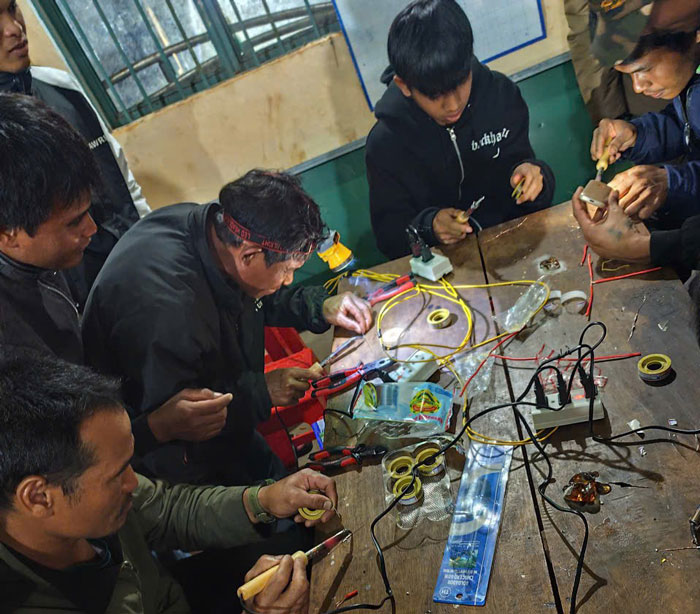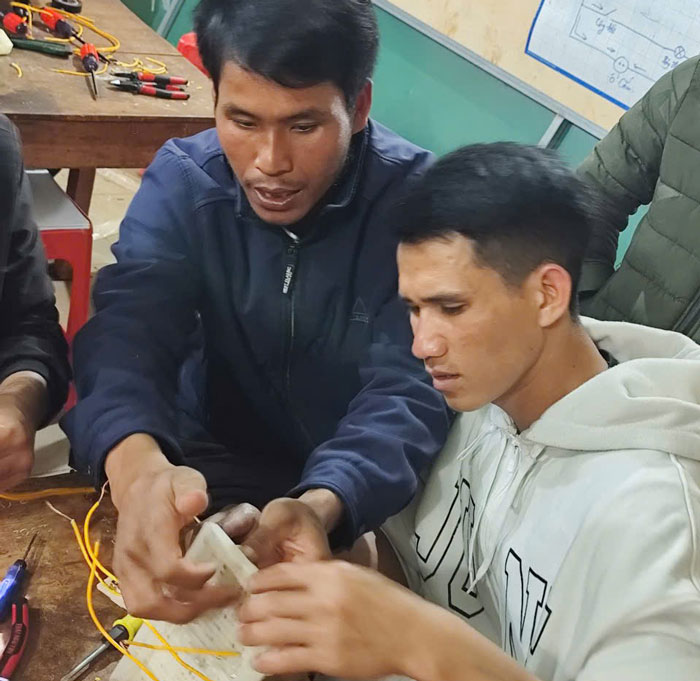Working day and night to bring books to study electricity
After a day of hard work in the fields, as usual, many workers in Ia Phi commune, Gia Lai province gathered in front of the village cultural house. In hand, students have electrical outlets, plugs, light bulbs and even a hood.
Mr. Ro Cham Pong (born in 1989, Ia Phi commune) said: "When I arrived at class, I was taught about electrical characteristics, civil electrical equipment, common fire and explosion damage and how to overcome them to avoid electric shock that endangers their lives."

According to Mr. Pong, lecturers in practical classes, operating on electrical appliances is actually the main task, while there is less theory. Thanks to that, students who are farmers, workers, and laborers in mountainous villages are easily reached and can understand the lessons quickly.
Mr. Ro Cham Djim (born in 1996, residing in Ia Phi commune) said: "My house run on an explosive device and often has an electrical short circuit, every time I call a worker to repair it, it takes a lot of time and money. Thanks to studying electrical, I have more knowledge to repair household items such as TVs, electrical appliances and agricultural tractors by hand. Later, I hope to be able to help households in the village repair, earn a little extra income, and improve their lives".

Not only Pong and Djim but many other students also try to make the most of their time coming to class in the evening to practice electricity. Electrical current, electrical contractors, welding, hot - cold wires... become interesting lessons, attracting students to participate after tiring hours of work in the fields or in the middle of the rubber forest.
Strengthening vocational training to improve labor productivity
A representative of the Chu Pah Vocational Education - Continuing Education Center, Gia Lai province said that as well as rice cultivation, coffee, agricultural machinery repair, and civil electricity, the profession is very practical, close to the daily needs of students and workers. Therefore, the center coordinated with the People's Committee of Ia Phi commune to open classes according to the National Target Program on Sustainable Poverty Reduction.

The school focuses on teaching practical knowledge and basic knowledge so that workers can apply immediately. From installing sockets, knives, bridges to using power lines to equipment, students all strive to learn and learn.
Not only teaching about electricity, lecturers also impart experience in electricity in factories and workshops, and electrical safety for production and business. With qualifications and primary vocational certificates in hand, ethnic minority workers can easily apply for jobs in factories and processing facilities in the area in need.

In recent years, the Provincial Party Committee and the People's Committee of Gia Lai province have focused on and oriented vocational training for rural, mountainous and ethnic minority workers. The provincial government highly appreciates the role of vocational training for workers to reach the goal of industrialization and modernization of the country.
Gia Lai strives to attract over 3,000 rural and mountainous workers to participate in vocational training at all levels in the field of vocational education every year. Thereby, contributing to increasing the rate of trained workers with degrees and certificates in the province to 25% by 2030.

The People's Committee of Gia Lai province also requires improving the quality and effectiveness of vocational training for ethnic minority workers to improve the quality of human resources in rural areas. Thereby, contributing to increasing labor productivity, creating jobs, stabilizing income, building new rural areas and sustainably reducing poverty.











